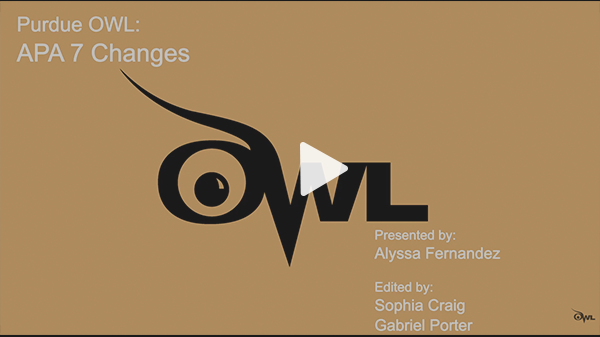|
Changes to reference and citation formats ͏ ͏ ͏ ͏ ͏ ͏ ͏ ͏ ͏ ͏ ͏ ͏ ͏ ͏ ͏ ͏ ͏ ͏ ͏ ͏ ͏ ͏ ͏ ͏ ͏ ͏ ͏ ͏ ͏ ͏ ͏ ͏ ͏ ͏ ͏ ͏ ͏ ͏ ͏ ͏ ͏ ͏ ͏ ͏ ͏ ͏ ͏ ͏ ͏ ͏ ͏ ͏ ͏ ͏ ͏ ͏ ͏ ͏ ͏ ͏ ͏ ͏ ͏ ͏ ͏ ͏ ͏ ͏ ͏ ͏ ͏ ͏ ͏ ͏ ͏ ͏ ͏ ͏ ͏ ͏ ͏ ͏ ͏ ͏ ͏ ͏ ͏ ͏ ͏ ͏ ͏ ͏ ͏ ͏ ͏ ͏ ͏ ͏ ͏ ͏ ͏ ͏ ͏ ͏ ͏ ͏ ͏ ͏ ͏ ͏ ͏ ͏ ͏ ͏ ͏ ͏ ͏ ͏ ͏ ͏ ͏ ͏ ͏ ͏ ͏ ͏ ͏ ͏ ͏ ͏ ͏ ͏ ͏ ͏ ͏ ͏ ͏ ͏ ͏ ͏ ͏ ͏ ͏ ͏ ͏ ͏ ͏ ͏ ͏ ͏ ͏ ͏ ͏ ͏ ͏ ͏ ͏ ͏ ͏ ͏ ͏ ͏ ͏ ͏ ͏ ͏ ͏ ͏ ͏ ͏ ͏ ͏ ͏ ͏ ͏ ͏ ͏ ͏ ͏ ͏ ͏ ͏ ͏ ͏ ͏ ͏ ͏ ͏ ͏ ͏ ͏ ͏ ͏ ͏ ͏ ͏ ͏ ͏ ͏ ͏ ͏ ͏ ͏ ͏ ͏ ͏ ͏ ͏ ͏ ͏ ͏ ͏ ͏ ͏ ͏ ͏ ͏ ͏ ͏ ͏ ͏ ͏ ͏ ͏ ͏ ͏ ͏ ͏ ͏ ͏ ͏ ͏ ͏ ͏ ͏ ͏ ͏ ͏ ͏ ͏ ͏ ͏ ͏ ͏ ͏ ͏ ͏ ͏ ͏ ͏ ͏ ͏ ͏ ͏ ͏ ͏ ͏ ͏ ͏
Bringing TOPkit Digest to You
|
|
Contents of this Digest:
- Video Tip: Changes in the 7th Edition of the APA Pub Manual
- Announcements: Register! TOPkit Workshop 2021 and Innovation Summit 2021
- Top Tips: APA Pub Manual – 7th Edition’s Top 5 Changes
- From the Community: APA Style 7th Edition Supports Evaluation Research
- Top Community Topics
|
|
Changes in the 7th Edition of the APA Pub Manual
Important Updates to Writing Style & Documentation Format |
|
|

|
|
The Purdue University Online Writing Lab (OWL) serves as a central hub for writing resources and instructional material; these materials are a free service of the Writing Lab at Purdue. Their resources are available at no charge to members of the campus community as well as users worldwide. Teachers and trainers may use this material for in-class and out-of-class instruction (Purdue University, 2020).
|
|
APA Pub Manual – 7th Edition’s Top Five Changes
Equity, Issues of Bias, and Simplification Drive Pub Manual’s Latest Edition |
|
|
|
Coming 10 years after the last update, APA’s 7th edition of their publication manual recognizes the importance of digital formats for scholarship; simplified formatting for digital sources includes eliminating retrieval dates for most web-based sources and the formatting of DOI (data object identifiers) numbers as URLs. The issue of bias in scholarship is addressed in a stand-alone chapter and, equity now includes recognition of traditional knowledge and narratives.
|
|
|
|
|
|
|
|
|
#1 - The use of "they" as a single pronoun. The APA recognizes that the use of singular personal pronouns reveals the gender of participants as well as authors referenced in the text. “Use 'they' as a generic third-person singular pronoun to refer to a person whose gender is unknown or irrelevant to the context of the usage” (American Psychological Association [APA], 2020, p. 119).
|
|
#2 - The acknowledgment of oral traditions and traditional knowledge. Oral traditions and traditional knowledge is now treated as a distinct source. “Work closely with Indigenous people to ensure that material is appropriate to publish and that your wording accurately mirrors and maintains the integrity of their perspectives” (APA, 2020, p. 259).
|
|
#3 - DOI numbers of journals appear as URLs. DOI numbers are formatted as URLs to facilitate access to the source. Example: Drollinger, T. (2006). Development and validation of the active empathic listening scale. Psychology & Marketing, 21(2), 161-180. https://doi.org/10.1002/mar.20105 | |
#4 - Limited use of retrieval date information. Retrieval dates are used sparingly in the 7th edition of the APA pub manual. References that require retrieval dates consist of websites that are continually updated (e.g., dictionary entry, Twitter profile, Facebook page). “Provide a retrieval date in the source element when citing an unarchived (i.e., not stable) work that is likely or meant to change. Including this date indicates to readers that the version of the work they retrieve may be different from the version you used” (APA, 2020, p. 289). Example: Little River Canyon Preserve. (n.d.). Home [Facebook page]. Facebook. Retrieved January 12, 2020 from https://facebook/com/lirinps #5 - Simplified format of website/online content. When creating a reference for a website, there is no need to include the title of the website if the website also appears as the author. Example: World Health Organization. (2018, March). Questions and answers on immunization and vaccine safety. https://www.who.int/features/qa/84/en/
|
|
|
Shelly Wyatt, PhD, Instructional Designer, Center for Distributed Learning, University of Central Florida (Shelly.Wyatt@ucf.edu)
|
|
APA Style 7th Edition Supports Evaluation Research
The Role of Research in Instructional Design and Faculty Development |
|
|
|
Robust research can drive continuous quality improvement that informs stakeholders and contributes to a growing body of scholarship. Identifying innovations that lead to enhanced success of both students and faculty ultimately strengthens the institution. Teaching faculty, with all the demands on their time, benefit from access to up-to-date resources that support educational research.
|
|
|
Patsy Moskal, PhD, Director of Digital Learning Impact Evaluation, Division of Digital Learning, University of Central Florida (Patsy.Moskal@ucf.edu)
|
|
Content Coordinator and Contributor
Shelly Wyatt, PhD, Instructional Designer, Center for Distributed Learning, University of Central Florida (Shelly.Wyatt@ucf.edu)
Editors
Bren Bedford, MNM, Web Project Analyst, Center for Distributed Learning, University of Central Florida
Samantha Richardson, B.A. English, Communications Specialist, Pegasus Innovation Lab, Center for Distributed Learning, University of Central Florida
|
|
|






